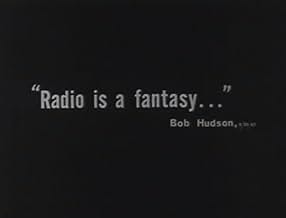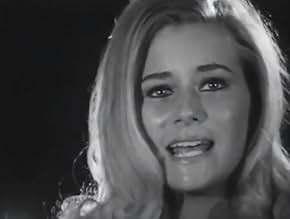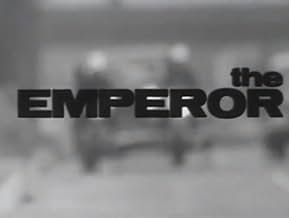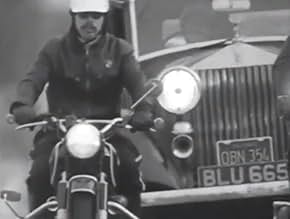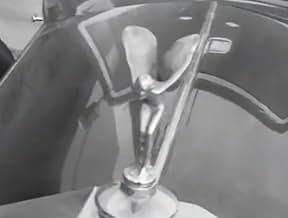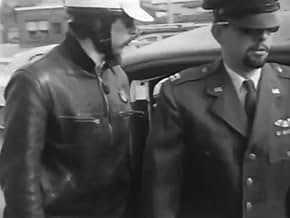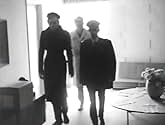Füge eine Handlung in deiner Sprache hinzuComments on the background and popularity of disc jockey "Emperor" Bob Hudson, who bases his shows on the idea that radio is a fantasy.Comments on the background and popularity of disc jockey "Emperor" Bob Hudson, who bases his shows on the idea that radio is a fantasy.Comments on the background and popularity of disc jockey "Emperor" Bob Hudson, who bases his shows on the idea that radio is a fantasy.
Empfohlene Bewertungen
Here's another student effort from the guy who made it cool to attend film school: Georgie Lucas. Surprisingly audacious cinematically, and almost plotless scriptwise, "The Emperor" is another in the long line of Lucas's student films that showcases the director's skill in establishing tone. This is a jokey documentary on a southern California disc jockey who proclaims himself "The Emperor". (Perhaps if you've seen a later, feature-length Lucas film, the title character might remind you of someone.)
While Lucas's other USC efforts ("Freiheit", "Anyone Lived in a Pretty How Town", and "Herbie") are humorless, well-meaning but dull, "The Emperor" is just the opposite. Benefiting from a worthy subject, this opus is funny, fast, and, at times, astonishingly innovative. Crammed with a rock soundtrack of sixties classics, "The Emperor" now feels like a precursor of "American Graffiti" (1973), albeit with a different visual approach; Graffiti was shot in 35mm color Techniscope. "The Emperor", on the other hand, is laced in a Richard Lesterish/French New Wave style: grainy B&W 16mm handheld camerawork and clever use of intertitles. (Note: "The Emperor" has an amazingly long pre-credit sequence; it's only beginning once you think it's over.) "Apocalypse Now" co-writer (and USC alum) John Milius was one of the crew members. Look sharp for a George Lucas cameo at the top of the film.
While Lucas's other USC efforts ("Freiheit", "Anyone Lived in a Pretty How Town", and "Herbie") are humorless, well-meaning but dull, "The Emperor" is just the opposite. Benefiting from a worthy subject, this opus is funny, fast, and, at times, astonishingly innovative. Crammed with a rock soundtrack of sixties classics, "The Emperor" now feels like a precursor of "American Graffiti" (1973), albeit with a different visual approach; Graffiti was shot in 35mm color Techniscope. "The Emperor", on the other hand, is laced in a Richard Lesterish/French New Wave style: grainy B&W 16mm handheld camerawork and clever use of intertitles. (Note: "The Emperor" has an amazingly long pre-credit sequence; it's only beginning once you think it's over.) "Apocalypse Now" co-writer (and USC alum) John Milius was one of the crew members. Look sharp for a George Lucas cameo at the top of the film.
For a nearly half-hour long student documentary film, "The Emperor" is fairly decent, if not the greatest as a documentary. Knowing George Lucas's masterful craft in previous works of his such as "1:42.08" and "Herbie", I honestly expected more from this twenty-four minute work than I got: the quality of the film itself is a bit on the lower end, with camerawork that seems much more amateur considering the great cinematography from those previously mentioned films. Maybe I expected a little too much from the short, which is something I never normally do, but the technical side isn't all that great, except for a nice blend of voiceovers and music. It feels as though the thing could have been more visually well-composed, and this surprises me when you take into account how well-made his other work is.
Lucas's student film focuses on the disc jockey legend Bob Hudson, who was apparently quite popular back in the day. While the views of the interior of the studio work quite well, a lot of the film itself seems to be far too reliant on the audio side, something that should never happen in any mainstream film (and "The Emperor", while being an independent student project, definitely leans into that genre). Most of the interviews are audio recordings, so that while we get a somewhat accurate portrait of the titular person, the visuals often don't have much to do with what is being spoken of. There is an entire sequence of voiceover with shots of cars going by on the road accompanying it, which feels irrelevant; visuals of studio equipment or records would have felt better. It seems as though Lucas had a lot of great audio stuff to add to the project, but struggled to come up with images to match, and this is definitely something to work on. Additionally, chaotic camerawork is used - not the well-composed cinematography in his previous films, but more along the lines of a home movie's camerawork. Not a bad film, but with some flaws to be sure and I prefer his conceptual shorts.
Lucas's student film focuses on the disc jockey legend Bob Hudson, who was apparently quite popular back in the day. While the views of the interior of the studio work quite well, a lot of the film itself seems to be far too reliant on the audio side, something that should never happen in any mainstream film (and "The Emperor", while being an independent student project, definitely leans into that genre). Most of the interviews are audio recordings, so that while we get a somewhat accurate portrait of the titular person, the visuals often don't have much to do with what is being spoken of. There is an entire sequence of voiceover with shots of cars going by on the road accompanying it, which feels irrelevant; visuals of studio equipment or records would have felt better. It seems as though Lucas had a lot of great audio stuff to add to the project, but struggled to come up with images to match, and this is definitely something to work on. Additionally, chaotic camerawork is used - not the well-composed cinematography in his previous films, but more along the lines of a home movie's camerawork. Not a bad film, but with some flaws to be sure and I prefer his conceptual shorts.
Short documentary directed by George Lucas about '60s DJ "Emperor" Bob Hudson, who was something of a big noise on the US radio back in the day. It was directed by George Lucas when he was a student, and young Master Lucas proves himself rather adept at making very little stretch a long way as we learn a lot about the Emperor's style but very little about the man himself. Shots of Hudson at work alternate with rather arty shots of 60s US street culture to surprisingly good effect, and Lucas's film has an energy that its portly subject lacks.
The Emperor (1967)
*** (out of 4)
Documentary of radio DJ Bob Hudson was written and directed by George Lucas while he was attending USC Film School. This is a pretty clever little short where Lucas gets to show off the subject but also some of his technical views as well. There are some pretty good shots throughout this B&W film including early on where we're listening to Hudson talk while the camera just zooms across the radio room and we get to see various things. Another good touch happens towards the end when we hear Donovan's Season of the Witch and Lucas shows off some of the local people. The film also benefits from a pretty good soundtrack, which shows Lucas' taste in music, which of course would become famous with American GRAFFITI. Fans of the director are certainly going to be entertained by this one and especially with the "end credits" happening at the middle of the picture!
*** (out of 4)
Documentary of radio DJ Bob Hudson was written and directed by George Lucas while he was attending USC Film School. This is a pretty clever little short where Lucas gets to show off the subject but also some of his technical views as well. There are some pretty good shots throughout this B&W film including early on where we're listening to Hudson talk while the camera just zooms across the radio room and we get to see various things. Another good touch happens towards the end when we hear Donovan's Season of the Witch and Lucas shows off some of the local people. The film also benefits from a pretty good soundtrack, which shows Lucas' taste in music, which of course would become famous with American GRAFFITI. Fans of the director are certainly going to be entertained by this one and especially with the "end credits" happening at the middle of the picture!
WUSSTEST DU SCHON:
- WissenswertesWhen this film was proposed for George Lucas' film school project, the faculty demanded Lucas keep the run time of the film to 10 minutes. Lucas had no intention of keeping to this directive, but purposely arranged the credits to run at that time limit, to the initial disappointment of his student colleagues that he apparently surrendered to the school's authority. However, the film continues after the credits for an additional 10+ minutes to the approval of the student audience to see Lucas had defied the school.
- Crazy CreditsUnder the writing credits, is a caption that reads, "With revisions by a host of others"
- VerbindungenFeatured in A Legacy of Filmmakers: The Early Years of American Zoetrope (2004)
Top-Auswahl
Melde dich zum Bewerten an und greife auf die Watchlist für personalisierte Empfehlungen zu.
Details
- Herkunftsland
- Sprache
- Weitere beteiligte Unternehmen bei IMDbPro anzeigen
- Laufzeit24 Minuten
- Farbe
Zu dieser Seite beitragen
Bearbeitung vorschlagen oder fehlenden Inhalt hinzufügen

